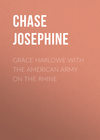Kitabı oku: «Marjorie Dean, High School Junior», sayfa 7
CHAPTER XIII – UNSEEN; UNKNOWN; UNGUESSED
Outside the school building Jerry Macy and Irma Linton were holding a patient vigil. Not permitted to witness the try-out they had declared their intention of waiting across the street for their friends. Confidently expecting that their wait would be long, they had set off for Sargent’s directly after school, there to while away at least a part of the time. It was twenty minutes after four when they returned to the school and determinedly perched themselves upon the top step of the long flight where they proposed to remain stationed until the try-out should be over. As ardent fans, they had a lively curiosity to know as soon as possible the results of the contest. They were also deeply concerned as to what had transpired between Marjorie and Miss Merton.
“Good gracious!” grumbled Jerry, as she frowningly consulted her wrist watch. “When do you suppose it will be over? It’s half-past five now. I hope – ”
“Hark!” Irma raised a warning hand. “I hear voices. Here they come at last.”
As she spoke the heavy door behind her swung open. One after another the contestants began issuing forth to unite into little groups as they passed down the steps to the street. Jerry and Irma were now on their feet eagerly watching for their friends. Jerry’s shrewd power of observation had already been put to good use. Thus far she glimpsed defeat in the faces of those who passed. Among them was Mignon La Salle. Her arm linked in that of Charlotte Horner, the French girl was carrying on a low-toned monologue, the very nature of which could be read in the stormy play of her lowering features.
Jerry gave Irma a significant nudge as Mignon switched past them without sign of recognition. Irma nodded slightly to show that she understood its import. She, too, had guessed that Mignon had not made the team.
“At last!” Jerry sighed relief, as Marjorie stepped across the threshold, followed by Susan, Muriel and Daisy Griggs. “What’s the good word?” She hailed.
“We are the real people,” boasted Muriel Harding, a throbbing note of triumph in her light tones. “Marjorie, Susan, Daisy and I made the team. The fifth girl is Rita Talbot. She was the only one of the blues chosen. Poor Harriet didn’t make it. Neither did Esther. Harriet’s been chosen as a sub, though. So has that queer little green-eyed Warner girl. She’s such a quiet mouse, I never even dreamed she could play basket ball. She can, though.” Muriel rattled off all this, hardly stopping to take breath.
“So dear Miss Merton changed her mind,” burst forth Jerry irrelevantly. “How long did she keep you, Marjorie? What did she say?” They had now progressed as far as the sidewalk and had halted there to talk.
Marjorie entered into brief details, giving Muriel the lion’s share of credit for her blunt explanation to Miss Archer. “If Muriel hadn’t spoken so plainly, Miss Archer might not have seen things in the right light,” she ended.
“Don’t you believe it,” disagreed Jerry. “Miss Archer knows Miss Merton like a book. It’s a real comfort to have a principal like her. Say, I’ll bet Mignon is so mad she can’t see straight. You should have seen her when she passed us. She was talking a blue streak to that Miss Horner. She was one of the judges, wasn’t she?”
“Yes.” Marjorie’s face clouded at mention of the languidly spoken senior. It now occurred to her that she had not been at fault in believing that Charlotte Horner disliked her. No doubt Mignon was the motive for her dislike. Like Ellen, she, too, tardily recalled that the two had been occasionally seen together last year. It might account also for the emphatic wagging of heads that had gone on among the three judges before the final result of the try-out had been announced.
“I suppose you are going to play the sophomores.” Irma’s soft intonation brought Marjorie out of her brown study.
“Of course.” It was Daisy Griggs who answered. “They are to have their try-out to-morrow afternoon. I don’t believe we will be ready to play them before November. We have a lot of practice ahead of us. We’ll have to have new suits, too. But we won’t know until we have a meeting what colors to choose. We ought to ask the subs what they’d like. We can’t very well go by the junior colors this year. They are deep crimson and white, you know. We couldn’t possibly have white suits with a crimson J, and crimson suits wouldn’t be pretty, either.”
“I think they would,” put in Muriel Harding stoutly. “We could have our suits of a little darker crimson than the class color. They would be stunning with a white J on the blouse and a wide, rolling collar of white broadcloth. Besides, crimson is a victorious color. We’d just have to win. It would be inspiring.”
“It sounds good to me,” approved Susan. “They’d certainly be different from any we’ve ever had. We could all put together and buy the cloth. Then have them made by one person instead of each going to our own dressmaker.”
“I think that would be nice,” nodded Marjorie. “But we want to please Daisy, too, so perhaps – ”
“Oh, I don’t mind. Just so they aren’t a glaring red,” hastily amended Daisy. “I suppose the subs will want to have new suits, too. We ought to call a meeting of the team some time this week. That reminds me, we don’t know yet who is to be captain. You ought to be, Marjorie. I think Ellen will ask you.”
“No.” Marjorie shook a decided head. “To be given center is honor enough for me. Girls, I’d love to have Muriel for captain. She’d be simply splendid.”
“Oh, no, not me,” protested Muriel in ungrammatical confusion. Nevertheless, she flushed with pleasure at Marjorie’s generous proposal.
“That would be fine,” asserted Susan Atwell heartily. She was not in the least jealous because Marjorie had not proposed her for the honor. She had long since learned that Marjorie Dean was incapable of showing favoritism. She had selected Muriel strictly with the good of the team in mind.
“Let’s ask Ellen if we can’t have Muriel,” said Daisy Griggs earnestly.
“You see three of us are of the same mind,” Marjorie pointed out with a smile. “I know Rita will say so, too. But where are she and Harriet?”
“Still in the gym, I guess, with Ellen. Harriet lives next door to Ellen,” reminded Susan. “They’ll be along presently.”
“I can’t wait for them,” Marjorie demurred. “It’s almost six. Captain will wonder why I’m so late. Come on, Jerry and Irma,” she called. Jerry and Irma had wandered a little away from the group and were deeply engaged in earnest discussion. “How many of you are going our way?”
“I’m going to my aunt’s for dinner,” said Muriel. “So I’ll say good-bye. Daisy goes my way, too. See you to-morrow. Come along, Daisy.”
Left to themselves, Susan, Marjorie, Irma and Jerry swung off toward home, four abreast.
“See here, Marjorie,” began Jerry. “You want to look out for Mignon. I told you how mad she looked when she passed us. Irma saw, too. She’ll try to do something to get you off the team and herself on. See if she doesn’t.”
“I’m not going to bother my head about her,” Marjorie made careless reply. “She has never really hurt anyone she’s tried to hurt since I’ve known her. With Ellen Seymour managing the teams, we are all sure of fair play.”
“Don’t be too sure,” muttered Jerry. She added in a louder tone, “Ellen’s not much protection with Mignon on the job. If she can’t play, she’ll try to fix it so somebody else can’t. Not you, perhaps. Anyway, it won’t do any harm for you to keep your eyes open.”
“Don’t croak, Jeremiah.” Marjorie laid a playful hand on Jerry’s lips. “Didn’t I tell you long ago that I should not allow Mignon La Salle to trouble me this year? I am going to keep at a safe distance from her.”
“I hope you stick to that,” was Jerry’s ungracious retort. Under her breath she added, “but I doubt it.”
Jerry Macy’s well-meant warning was destined, however, to come back most forcibly to Marjorie no later than the following morning. As she ran down the steps of her home and on down the walk on her way to school, she encountered the postman at the gate. He handed her two letters, which she received with a gurgle of girlish delight. On the top envelope she had glimpsed Mary’s familiar script. The gurgle changed to a dismayed gasp as she examined the other. Only too quickly had she recognized the handwriting. Shoving Mary’s letter into the pocket of her pretty tan coat, she hastily opened the other envelope. Her evil genius had again come to life. A wave of hot resentment swept her as she unfolded the one sheet of heavy white paper and read:
“Miss Dean:
“No doubt you think yourself very clever to have made the junior team. You could never have done so had partiality not been shown. Others at the try-out were much more worthy of the choice. You believe because you can dress like a doll and are popular with a few rattle-brained girls that everyone likes you. But you are mistaken. A few persons, at least, know how vain and silly and deceitful you are. You pretend to hate snobbery, but you are a snob. Some day everyone will know you for what you really are. The time is not far off. Beware.
“The Observer.”
Turning, Marjorie went slowly back to the house and climbed the stairs to her room. Pausing before her desk, she opened it. From a pigeon-hole she extracted another letter. Carefully she compared it with the one that had come by post. Yes, they must have both emanated from the same source. Stationery, writing and signature were unmistakable proofs. With a sigh she shoved them both into the pigeon-hole. Who could her mysterious enemy be? These letters were certainly of the variety she had heard classed as “poison pen.”
Thus far she had flouted the idea of Mignon La Salle as the writer of them. Now she was forced to wonder if she had been wrong. Was it possible that Mignon had lurked outside Miss Archer’s office on the morning when she had solved the problem for Rowena Farnham? If this were so, the letter Miss Archer had received might then be accredited to her, as well as the two now in her desk. Barring Rowena Farnham, Marjorie knew no one else who would be likely to engage in such a despicable enterprise. If Mignon were guilty of this, Jerry Macy’s warning had not been an idle one. It, therefore, behooved her, Marjorie Dean, to be on her guard. Yet how could she guard herself against a shadow, an enemy unseen; unknown; unguessed?
CHAPTER XIV – A SOLDIER IN EARNEST
Absorbed in a vain attempt to find a clue to the mysterious prophesier of evil, Marjorie forgot Mary Raymond’s letter until she happened to thrust a hand into her coat pocket on the way home from school at noon. Mary’s long, cheery epistle partially atoned for the hateful sentiments expressed by the unknown. On her return home in the afternoon, a second comforter was accorded her in a letter from Constance Stevens. The day after Marjorie and Jerry had spent the evening at Gray Gables Mr. Stevens had gone to New York. Constance had accompanied him.
Since the great change had taken place in the girl’s life her school days had been more or less broken. Still she managed to keep up in her classes despite frequent short absences from school. It was tacitly understood, not only by Miss Archer, but also by Constance’s other teachers, that she intended to study for a grand opera début as soon as her high school days were over. The mere possession of so remarkable a voice as was hers rather set her apart in some indefinite fashion from her schoolmates. Where others would have been taken to strict account for absence, she was allowed an unusual amount of consideration. Undoubtedly, the fact that when actually in school she invariably acquitted herself with credit in her various studies had much to do with the leniency accorded her. From a very humble person, she was rapidly becoming a personage from whom Sanford expected one day to hear great things.
Marjorie Dean felt Constance’s absences more keenly than anyone else. She had been particularly lonesome for her friend during this latest one, and the news that Constance would return to Sanford and to school on the following week banished for the time the shadow of the morning’s unpleasant incident.
“Constance will be home on Sunday, Captain,” she caroled gleefully, as she danced about the living room by way of expressing her jubilation.
“I am glad to hear it. You really need the child to cheer you up. You’ve been looking rather solemn lately, my dear. Aren’t you happy in your school? Sit down here and give an account of yourself,” commanded Mrs. Dean with a smile.
“Oh, yes.” The answer was accompanied by a faint sigh, as Marjorie curled up on the floor beside her mother. “So far, this has been rather a queer year, though. Nothing very pleasant has happened except basket ball. That’s always a joy. Our team is doing beautifully. We are to play the sophomores on the Saturday before Thanksgiving. It’s going to be a real tussle. Ellen Seymour says there are some great players among the sophs. You’ll come to the game, Captain?”
“I suppose I must. You consider me a loyal fan. That means I must live up to my reputation. By the way, Lieutenant, did that girl who made you so much trouble enter high school? You never told me.”
“You mean Rowena Farnham? Yes; she was allowed to try another set of examinations. Jerry Macy said she won the chance by only one vote. Jerry’s father’s a member of the Board. I wouldn’t tell anyone else but you, though, about that one vote. She is a sophomore now. I see her in the study hall, but we never speak. The girls say she is quite popular with the sophs. I suppose she’s trying hard to make up her lost ground.” Marjorie’s inflection was slightly bored. She felt that she had small cause for interest in Rowena. She had never told her mother of the latter’s attack on herself and Jerry. She preferred not to think of it, much less talk of it. To her it had seemed utterly senseless, as well as cheap.
“And how is Mignon La Salle doing?” questioned Mrs. Dean. “I haven’t heard you mention her, either. I must say I am very glad that you and she are not likely to be thrown together again. Poor little Mary made a bad mistake last year. It is wonderful that things ever worked out as well as they did.” Mrs. Dean’s face grew stern as she recalled the tangle in which Mary’s obstinacy had involved her daughter.
“Oh, Mignon has found a friend in Rowena Farnham. They go together all the time. Jerry says they will soon fall out. I am sure they are welcome to chum together, if they choose.” Marjorie shrugged her shoulders as though desirous of dismissing both girls from her thoughts.
“Jerry is quite likely to be a true prophet,” commented Mrs. Dean. “She is a very wise girl, but decidedly slangy. I cannot understand why a girl brought up in her surroundings should be so thoroughly addicted to slang.”
“She’s trying awfully hard not to use it.” Recalling Jerry’s recent efforts to speak more elegant English, Marjorie laughed outright. “She’s so funny, Captain. If any other girl I know used slang as she does, I wouldn’t like it. But Jerry! Well, she’s different. Next to Connie and Mary I love her best of all my friends. I don’t know what I’d do without her.”
“She is a very fine girl, in spite of her brusque ways,” praised Mrs. Dean. “General is fond of her, too.” She added this little tribute lest Marjorie might feel that she had been unduly critical. She understood the fact that Marjorie’s friends were sacred to her and on that account rarely found fault with them. Marjorie could be trusted to choose her associates wisely. Those to whom her sympathies went out usually proved themselves worthy of her regard. Motherly anxiety alone had prompted Mrs. Dean to draw her daughter out with a view toward learning the cause of Marjorie’s recent air of wistful preoccupation. Daily it had become more noticeable. If a repetition of last year’s sorrows threatened her only child, Mrs. Dean did not propose to be kept in the dark until it became well-nigh impossible to adjust matters.
Secretly Marjorie was aware of this anxiety on her mother’s part. She felt that she ought to show her Captain the sinister letters she had received, yet she was loath to do so. Her mother’s inquiry concerning Mignon had caused her to reflect uneasily that now if ever was the moment for unburdening her mind. “Captain,” she began, “you know that something is bothering me, don’t you?”
“Yes. I have been hoping you would tell me.” Mrs. Dean laid an encouraging hand on the drooping, brown head against her knee.
“Wait a minute.” Imbued with a desperate energy, Marjorie sprang to her feet and ran from the room. She soon returned, the disturbing letters clutched tightly in one hand. “I wish you to read these,” she said. Tendering them to her mother, she drew up a chair opposite Mrs. Dean and sat down.
Silence hung over the cheerful room while Mrs. Dean acquainted herself with the cause of Marjorie’s perturbation. Contempt filled her voice as she finally said: “A most despicable bit of work, Lieutenant. The writer had good reason to withhold her true name. So this explains the solemn face you have been wearing of late. I wouldn’t take it very deeply to heart, my dear. Whoever wrote these letters must possess a most cowardly nature.”
“That’s just what I think,” nodded Marjorie. “You see it really started with the letter Miss Archer received. You know, the one about the algebra problem. The only person I can really suspect of writing any of them is Mignon. But she’s not this sort of coward. Besides, I don’t believe she’d write just this kind of letter. What sort of person do you think would, Captain?”
Before answering, Mrs. Dean thoughtfully reread both letters. “It is hard to say,” she mused. “It looks to me as though the writer of them might have been prompted by jealousy. The second one in particular is full of jealous spite. I suppose you don’t care to let Miss Archer see them.”
“No.” Marjorie shook a vehement head. “I’d rather worry through without that. Perhaps there won’t be any more of them. I hope not. Anyway, I’m glad I told you about them. If another does come, I can bring it to you and not feel so bad over it as if I had to think things out alone. Even if I knew this very minute who wrote them, I don’t know what I’d do about it. It would depend upon who the girl was, whether or not I’d say anything to her. It’s all very mysterious and aggravating, isn’t it?” she added wistfully.
“It’s far worse than that.” Mrs. Dean’s lips set in a displeased line. “Sanford High School appears to harbor some very peculiar girls. I can’t imagine any such thing happening to you at Franklin High. I don’t like it at all. If the rest of your junior year is going to be like this, you might better go away to a good preparatory school.”
“Oh, Captain, don’t say that!” Marjorie cried out in distress. “I couldn’t bear to leave you and General and Sanford High. I’d be terribly unhappy away from home. Please say you didn’t really mean that.” Tears lurked in her pleading tones.
“Now, now, Lieutenant,” came the soothing reply, “don’t be so ready to run out to meet calamity. I only suggested your going away as a means of taking you out of these pits you seem always innocently to be tumbling into. You know that General and I could hardly get along without our girl. It is of your welfare I am thinking.”
Marjorie slipped to her mother’s side and wound coaxing arms about her. “I was afraid this would hurt you. That’s why I hated to tell you. Don’t worry, Captain. Everything will come out all right. It always has, you know. So long as I keep a clear conscience, nothing can really hurt me. I hope I’m too good a soldier to be frightened, just because I’ve been fired upon by an unseen enemy. If I ran away now I’d be a deserter, and a deserter’s a disgrace to an army. So you see there’s only one thing to do; stand by and stick fast to my colors. I’ve got to be a soldier in earnest.”
CHAPTER XV – AN UNWILLING FOLLOWER
Marjorie’s confidential talk with her Captain brought to her a renewal of faith in herself, which carried her along serenely through various small difficulties which continually sprang up in her junior path. One of them was Miss Merton, who seemed always on the watch for an opportunity to belittle the girl she so detested. Still another was the hostile interest Mignon La Salle had again begun to take in her. Hardly a day passed without an angry recital on Jerry’s part of something she had heard against Marjorie, which had originally come from Mignon or Rowena Farnham. Mignon’s ally, Charlotte Horner, was an equal source for provocation. Although she had no special right to do so, she often dropped in on junior basket ball practice merely to find food for adverse criticism of Marjorie. She watched the latter with a hawk-like eye, only to go forth and make capital of any small imperfection in Marjorie’s playing, which she saw or fancied she saw.
The fact that Rowena Farnham was a member of the sophomore team did not add to Marjorie’s happiness. She had no wish to come into such close contact with her, which the approaching games between the two teams would necessitate. From Jerry, the indefatigable news-gatherer, she had learned that Rowena was a skilful, but rather rough player. Knowing her to be utterly without scruple, Marjorie had small reason to believe she could be trusted to play an absolutely fair game against her opponents. Rowena was already becoming an insolent power in the sophomore class. Her extreme audacity, coupled with her good looks and fine clothes, brought her a certain amount of prestige in Sanford High School. She possessed to a marked degree that impudent quality of daring, which is so peculiarly fascinating to school girls.
Although she was not sincerely liked she was admired and feared. She had a fund of clever sayings at her command, which gave her a reputation for brilliancy. The frequent reproof of her teachers rolled off her like water from a duck’s back. She made public sport of whomever she pleased, whenever it pleased her to do so, with a conscienceless air of good humor that rendered her a dangerous foe. She never hesitated to forge her way to whatever she wanted, in a hail-fellow-well-met manner which changed like a flash to insolence with the slightest opposition offered. She was a bully of the first water, but with the glamor of her newness still upon her, the worst side of her nature was yet to be revealed to many.
Marjorie Dean and Jerry Macy, at least, entertained no illusions concerning her. Neither did Mignon La Salle. For once in her life, Mignon was beginning to find herself completely overshadowed by a nature far more hatefully mischievous than her own. True she was Rowena’s most intimate friend. Yet there were times when she inwardly regretted having rushed blindly into such a friendship. Striving ever to rule, now she was invariably overruled. Instead of being leader, she became follower. Rowena criticized, satirized and domineered over her, all in the name of friendship. Had she been anyone else, Mignon would not have borne long with her bullying. She would have speedily put an end to their association. Rowena, however, was one not thus easily to be dropped. In Mignon she glimpsed powers for mischief-making only secondary to her own. She preferred, therefore, to cling to her and was clever enough never to allow Mignon’s flashes of resentment against her high-handedness to mature into open rebellion. Those who knew the French girl for exactly what she was agreed that Mignon had at last met her match. They also agreed that a taste of her own medicine would no doubt do her a great deal of good.
The approach of Thanksgiving also brought with it a stir of excitement for the coming basket ball game, the first to be played in a series of four, which were scheduled to take place at intervals in the school year. The sophomore team had already played the freshman and given them a complete whitewashing. Now they were clamoring to meet the juniors and repeat their victory. The junior team had attended the freshman-sophomore game in a body, thereby realizing to the full the strength of their opponents. Reluctantly, they were forced to admit the brilliancy of Rowena Farnham as a player. She knew the game and she went into it with a dash and vigor that marked her as a powerful adversary. Naturally, it won her an admiration which she determined should grow and deepen with each fresh achievement.
Her doughty deeds on the floor of contest merely imbued the junior team with stronger resolution to win the coming game. They practised with stubborn energy, sedulously striving to overcome whatever they knew to be their weak points. Though manager of all the teams, Ellen Seymour’s heart was secretly with them. This they felt rather than knew. Outwardly, Ellen was impartial. She made them no show of favoritism, but they divined that she would rejoice to see them win. There was no doubt of the smoothness of their team work. Having played basket ball on the freshman and sophomore teams, Marjorie Dean herself knew that the squad of which she was now a member excelled any other of past experience. Fairly confident that it could hold its own, she looked impatiently forward to the hour of action.
To set one’s heart too steadfastly on a particular thing, seems sometimes to court disappointment. On the Thursday before the game an unexpected state of affairs came to pass. It started with a notice on the bulletin board requesting the presence of the junior team in the gymnasium at four o’clock that afternoon. It was signed “Ellen Seymour, Manager.” Naturally, the juniors thought little of it. They were accustomed to such notices. Ellen, no doubt, had some special communication to make that had to do with them. But when five minutes after four saw them gathered in the gymnasium to meet their manager, her sober face warned them that the unusual was afoot.
“Girls, I have something to ask of you which you may not wish to do. I am not going to urge you to do it. You are free to choose your own course. As it especially concerns you, yours is the right to decide. Two girls of the sophomore team are ill. Martha Tyrell has come down with tonsilitis, and Nellie Simmons is threatened with pneumonia. Both are in bed. They can’t possibly play on Saturday. The sophs are awfully cut up about it. They wouldn’t mind using one sub, but two, they say, is one too many. They have asked me to ask you if you are willing to postpone the game until these girls are well again.”
“I don’t see why we should,” objected Captain Muriel Harding. “I don’t believe they’d do the same for us. Of what use are subs, if not to replace absent players?”
“That’s what I think,” put in Daisy Griggs. “It’s too provoking. Everyone is looking forward to the game. If we don’t play we’ll disappoint a whole lot of people. It’s very nervy in the sophs to ask us to do such a thing. Besides, we are crazy to wear our new suits.”
Ellen smiled quizzically. “Remember, you are to do as you please about it,” was all she said, betraying neither pleasure or displeasure at the ready protests.
“I suppose the sophomores will think us awfully mean if we don’t do as they ask,” ventured Rita Talbot.
“Oh, let them think,” declared Susan Atwell impatiently. “It’s the first time I ever heard of such a thing. They must be terribly afraid we’ll beat them.”
“That’s just the point.” At this juncture Marjorie broke into the discussion. “If we insist on playing and win, they might say we won because we had them at a disadvantage. That wouldn’t be much of a victory, would it?”
“That’s so.” Muriel reluctantly admitted the force of Marjorie’s argument. “I know at least one of them who would say just that.”
“Mustn’t be personal,” gently chided Ellen. Nevertheless, there was a twinkle in her blue eyes. The sophomore who had come to her had insinuated what Marjorie had voiced. “I’ll give you ten minutes to talk it over. I promised to let the sophomores know to-night. The girl who came to me is waiting in the senior locker room for your answer.”
“I’m ready to decide now,” asserted Marjorie. “For my part I’m willing to postpone the game.”
“We might as well,” conceded Captain Muriel ruefully. Marjorie’s point had gone home. “If we win we want it to be a sweeping victory.”
One by one the three other interested parties agreed that it seemed best to yield gracefully to the plea.
“Now that you’ve all spoken I’m going to tell you my opinion,” announced Ellen. “I am glad that you are willing to do this. It becomes you as juniors. No one can say that you have been anything but strictly generous. You deserve a crown of victory for being so nice about this.”
Ellen’s conclusion brought a smile to five faces. Her remark might be construed as a declaration of favor toward them.
“I believe you’d love to see us win the whole four games, Ellen Seymour,” was Muriel’s frank comment.
“As your august manager, my lips are sealed,” Ellen retorted laughingly. “Now I must leave you and put an anxious sophomore out of her misery. While you are waiting for the sick to get well you can put in some more practice.” With this injunction she left them.
Once out of the gymnasium, her smile vanished. The anxious sophomore was Rowena Farnham. Ellen cherished small liking for this arrogant, self-centered young person whose request had been more in the nature of a command. Personally, she had not favored putting off the game. Had illness befallen a member or members of any team on which she had formerly played, no such favor would have been asked. Nothing short of incapacitation of the whole squad would have brought forth a stay in activities. Yet as manager she was obliged to be strictly impersonal. True, she might have exercised her authority and herself made the decision. But she had deemed the other way wisest.
On entering the senior locker room she was still more annoyed to find Mignon La Salle with Rowena. If Ellen disliked the latter, she had less love for the tricky French girl. “Birds of a feather,” she mentally styled them as she coldly bowed to Mignon. Her chilly recognition was not returned. Mignon had not forgiven her for the try-out.









